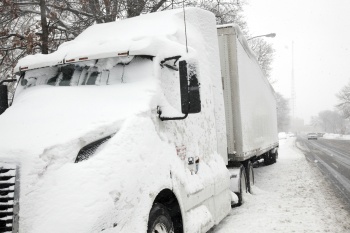Truck drivers offer safety tips for winter road conditions
Recent heavy winter storms across the nation have underscored the need for all drivers, including truckers, to take extra precautions when traveling during the winter months.
The American Trucking Associations (ATA), the nation’s largest trucking association, has released a set of winter driving tips from America’s Road Captains, elite professional drivers who have literally weathered the storms on U.S. highways. America’s Road Captains are a group of drivers who have logged a million miles of accident-free driving.
The truck drivers’ tips on how to safely navigate through winter conditions include the following:
- Map your route: Know where you are going and be prepared, ahead of time, to exit off the highway when needed. Indecisive driving is a major cause of traffic problems.
- Avoid extreme weather conditions: Ice, hail and snow make roads difficult to travel. Try to avoid driving through extreme weather conditions, and travel during daylight as much as possible.
- Remove ice and snow from your vehicle: Clear your windows and roof of snow to ensure you have maximum visibility and avoid creating a hazard for the vehicle behind you. Don’t allow ice and snow to create additional blind spots on your vehicle.
- Slow Down: With winter weather conditions present, speeding becomes increasingly hazardous. Allow plenty of a space cushion and reduce your speed.
- Prepare an emergency kit: Contents should include: battery powered radio, flashlight, blanket, jumper cables, fire extinguisher, first aid kit, bottled water, non-perishable foods, maps, tire repair kit and flares.
- Watch for black ice, a thin layer of transparent ice that forms when temperatures are close to freezing. Black ice may make the road look slightly wet and is difficult to spot. Watch for ice build-up on your mirror arms, the antenna of your vehicle and the top corners of your windshield, all signs pointing to the formation of black ice on the roadways. Once the spray from tires on vehicles in front of you stops, the highways most likely are full of black ice.
- Be aware of truck blind spots: When sharing the road with large trucks, be cognizant of their large blind spots. If you can’t see the truck driver in his or her mirrors, then the truck driver can’t see you.
- Do not cut in front of large trucks: Remember that trucks are heavier and take longer to make a complete stop. Avoid cutting quickly in front of them.
- Keep your eyes on the road: Distracted driving is a major cause of traffic accidents. Just two seconds of distraction time for a motorist double the chances of an accident. Use your cell phone when stopped and never text while driving.
- Leave early and avoid risks: Leave early to avoid anxiety associated with arriving late to your destination and to accommodate potential unforeseen delays.
- Buckle up: Safety belts reduce the risk of fatal injury by 45 percent and are a simple way to increase your safety on the road.
“One of the largest driving concerns during times of cold weather is that of following distances. When the roads are slick, your normal following distance needs to double in length for snow and triple in length for icy conditions,” said Don Logan, a FedEx Freight driver and an America’s Road Team Captain from Eskridge, Kansas.
Winter Storm Dion, the fourth named winter storm of the 2013-14 season by the National Weather Service, produced snow in Washington, California, Nevada, Texas and parts of the Midwest earlier this month before heading east to hit the Great Lakes and Mid-Atlantic regions.
FedEx Corp. reported that although it’s put in place “contingency plans” to deal with the winter storm’s impact on air cargo and ground transportation operations, the company said some service delays and disruptions can be anticipated in a broad swath of states including: Arkansas, Illinois, Indiana, Kansas, Kentucky, Louisiana, Missouri, New Mexico, New York, Ohio, Oklahoma, Pennsylvania, Tennessee, Texas, and West Virginia.
Another storm hit the Midwest and East Coast last week and several storms are predicted in the Central, Eastern and Northwestern states into the week of Christmas.
“With severe weather affecting much of the country, we are balancing our priorities of employee safety and customer service,” noted rival United Parcel Service. “Our team is monitoring the situation and has contingency plans in place to minimize service disruptions.”
December storms have closed the federal government for non-emergency workers and major airports across the country have faced thousands of flight cancellations and delays.






